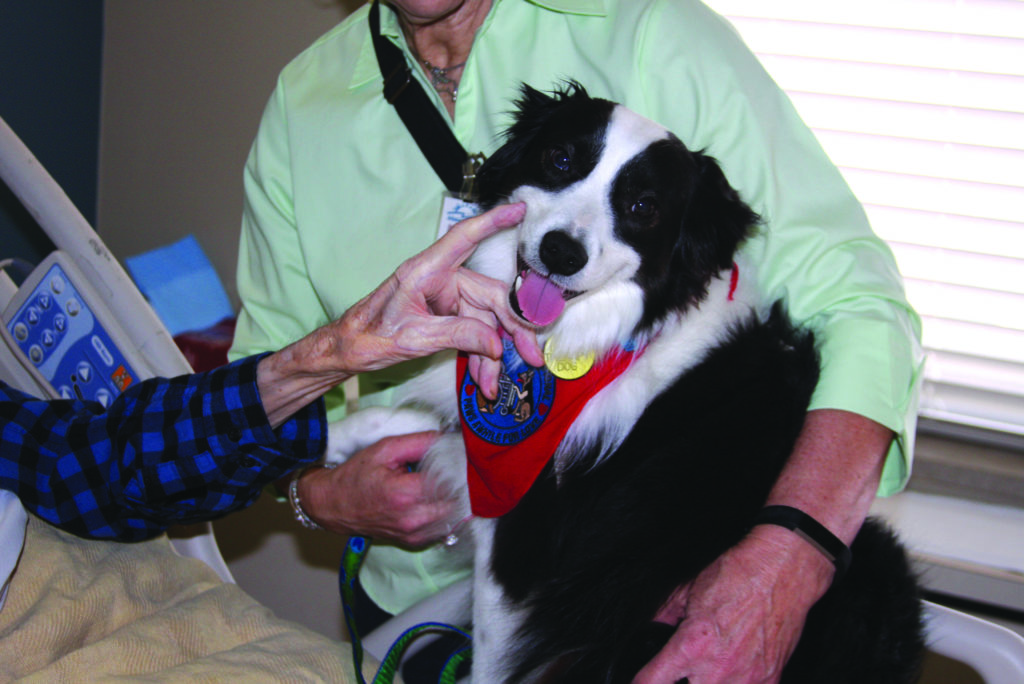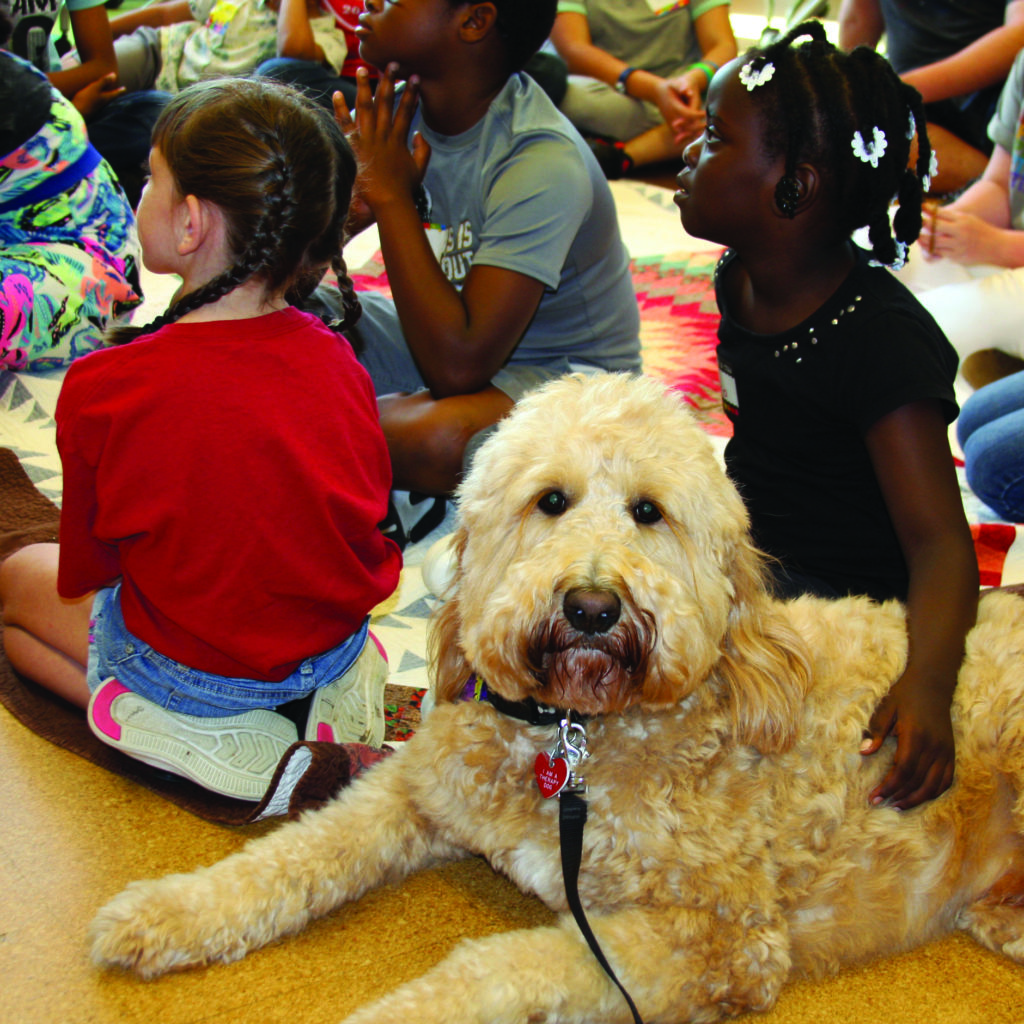Puppy Love: Therapy Dogs Brighten Days at Arkansas Hospice
At Arkansas Hospice, every volunteer plays a part to help care for those facing serious illness and loss. But only a select few do so on four legs.
Since 2001, the Arkansas Hospice Therapy Dog Program has been doing just that.
Not to be confused with service dogs that are specially trained to assist people with disabilities, therapy dogs help patients by simply visiting them. These special dogs have an ability to connect with all kinds of people, even those who seem to be unresponsive or disconnected from their environments.

Animals participating in Arkansas Hospice’s Therapy Dog Program must be certified by a national organization, and the dogs’ owners or handlers must be trained and certified Arkansas Hospice volunteers. These teams mainly visit patients in nursing homes or in one of the nonprofit organization’s three inpatient centers, located in Little Rock, Hot Springs and Russellville.
“Our program currently has about a dozen active dogs,” said Harriet Hawkins, Arkansas Hospice’s director of volunteers. Participants set their own pace and coordinate visits around their personal schedules.
One longtime volunteer is Merry Zakrzewski, who signed up in 2011. She visits Arkansas Hospice’s Ottenheimer Inpatient Center, located at CHI St. Vincent in Little Rock, with Splash and Riley, her two miniature American shepherds (sometimes called miniature Australian shepherds). The dogs take turns, with Splash going one time and Riley the next.
One of Zakrzewski’s most memorable experiences was taking Riley to see a patient who owned a similar dog. When they arrived, the patient’s wife asked for Riley to sit on the bed.
“The husband was unresponsive,” Zakrzewski said, “but his hand reached out and petted Riley.”
During a recent day at the Ottenheimer Center, Zakrzewski and Splash stopped in the rooms of two patients. Both times, Splash sat quietly on the beds, with his owner at his side, so that the patients could gently stroke his face and fur. The dog remained calm despite the presence of others, including a photographer.
A woman visiting one of the patients, a man who has been at the center for some time, said that he always looks forward to therapy dog visits.

“He just rubs on those dogs and says, “Hi, doggy. Hi, doggy,’” she said. “It brings joy to him.”
Splash seemed glad to see the man, too.
“The dogs just instinctively know which patients need them,” Zakrzewski said. “While Splash was very comfortable today, sometimes, he’ll go in and be a bit more standoffish. He knows the ones who are receptive.”
Visiting those approaching the end of life can be a delicate matter, so potential therapy dogs are carefully screened to make sure they are a good fit. In addition to being healthy, friendly and at least 1 year old, they also must receive obedience training and pass the American Kennel Club’s Canine Good Citizen Test. Then, they must be nationally certified by Therapy Dogs International, Pet Partners or the Alliance of Therapy Dogs. These steps ensure that therapy dogs can remain calm while not being distracted by food, medical equipment, visitors and other potential disturbances.
Adaptability is another key quality. Splash, for example, is an active dog when not performing his therapy dog duties.
“He runs agility,” Zakrzewski said. “So, he’s got an off and an on switch.”
Therapy dogs are known to help lower blood pressure and decrease anxiety – and to cheer up not only patients, but also their family members.
“The family needs something to break the day,” Zakrzewski said. “One time, it wasn’t possible for us to be in the room, but a woman came outside and just loved all over the dog.”
While therapy dog teams mainly visit patients in nursing homes or inpatient centers, they occasionally go to homes, when requested, and attend special events.
Lisa Privett, an Arkansas Hospice therapy dog volunteer since 2012, recalled taking Howie, a goldendoodle, to see a “lovely lady” in her home.
“She laughed and shared stories of all the dogs she had owned over the years while loving and hugging on Howie,” Privett said. “For an hour, she could forget the horrible diagnosis that faced her. She passed away about a week later.”
Privett and Howie are also key players at Arkansas Hospice’s Art for the Heart grief workshops, which are part of the organization’s Hope & Healing 4 Kids program.
“Art for the Heart workshops allow grieving children to come together in a safe place to play, laugh, share stories and work through feelings of loss,” said Barbara Ross, Arkansas Hospice’s bereavement director. “A therapy dog’s presence enhances normalcy, but also brings joy and healing to those who are most vulnerable during times of grief and loss.”
“Howie’s presence breaks the ice as the kids begin to congregate for the event,” Privett said. “Oftentimes, he will quietly seek out the older kids or teens who don’t want to be there or don’t want to participate. Howie sneaks up close to them and gently nudges their hands so they will have to pet him. Then, all of a sudden, that teenager’s face has a grin or even a smile. I’ve seen him do it hundreds of times.”
Hawkins said that therapy dogs can have a similar effect on adults.
“Being with a dog brings out childhood memories and memories of past pets,” she said. “It’s an icebreaker to start other conversations.”
To learn more about volunteer opportunities and pet therapy at Arkansas Hospice, CLICK HERE.
This article first appeared in the Spring 2019 edition of Arkansas Hospitals magazine, a publication of the Arkansas Hospital Association. Used with permission.


 Registered 501(c)(3). EIN:
Registered 501(c)(3). EIN: